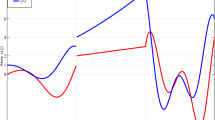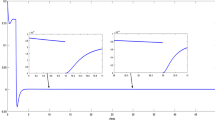Abstract
In this study, some properties of a novel Halanay-type inequality that simultaneously contains impulses and delayed impulses are investigated. Two concepts with respect to average impulsive gain are proposed to describe hybrid impulsive strength and hybrid delayed impulsive strength. Then, using the obtained results, two stability criteria are derived for the linear systems with impulses and delayed impulses. It is found that the stability of impulsive systems is robust with respect to delayed impulses of which the magnitude strength is relatively small. Whereas, if the impulse strength is small, the time-delayed impulses can also promote the stability of unstable systems. Two numerical examples are employed to illustrate the efficiency of our results.
Similar content being viewed by others

References
Matsumoto T, Kobayashi H, Togawa Y. Spatial versus temporal stability issues in image processing neuro chips. IEEE Trans Neural Netw, 1992, 3: 540–569
Bonnans, J F, Shapiro A. Nondegeneracy and quantitative stability of parameterized optimization problems with multiple solutions. SIAM J Opt, 1998, 8: 940–946
Li, Y Y, Li, B W, Liu Y, et al. Set stability and stabilization of switched boolean networks with state-based switching. IEEE Access, 2018, 6: 35624–35630
Knochel R, Schunemann K. Noise and transfer properties of harmonically synchronized oscillators. IEEE Trans Microw Theor Tech, 1978, 26: 939–944
Stack, J H, Whitney M, Rodems, S M, et al. A ubiquitin-based tagging system for controlled modulation of protein stability. Nat Biotechnol, 2000, 18: 1298–1302
Labovitz C, Malan, G R, Jahanian F. Origins of internet routing instability. In: Proceedings of the 18th Annual Joint Conference of the IEEE Computer and, Communications Societies, 1999. 218–226
Tang Y, Gao, H J, Zhang, W B, et al. Leader-following consensus of a class of stochastic delayed multi-agent systems with partial mixed, impulses. Automatica, 2015, 53: 346–354
Li, Y Y, Lou, J G, Wang Z, et al. Synchronization of dynamical networks with nonlinearly coupling function under hybrid pinning impulsive controllers. J Franklin Institute, 2018, 355: 6520–6530
Yang, X S, Lu, J Q, Ho D W C, et al. Synchronization of uncertain hybrid switching and impulsive complex networks. Appl Math Model, 2018, 59: 379–392
Mayne, D Q, Rawlings, J B, Rao, C V, et al. Constrained model predictive control: stability and, optimality. Automatica, 2000, 36: 789–814
Cao, J D, Li R X. Fixed-time synchronization of delayed memristor-based recurrent neural networks. Sci China Inf Sci, 2017, 60: 032201
Li Y Y. Impulsive synchronization of stochastic neural networks via controlling partial states. Neural Process Lett, 2017, 46: 59–69
Yang, X S, Song Q, Cao, J D, et al. Synchronization of coupled markovian reaction-diffusion neural networks with proportional delays via quantized control. IEEE Trans Neural Netw Learn Syst, 2019, 30: 951–958
Halanay A. Differential Equations: Stability, Oscillations, Time Lags. Pittsburgh: Academic Press, 1966
Huang, Z K, Cao, J D, Raffoul Y N. Hilger-type impulsive differential inequality and its application to impulsive synchronization of delayed complex networks on time scales. Sci China Inf Sci, 2018, 61: 078201
Brezis H, Lieb E H. Sobolev inequalities with remainder terms. J Funct Anal, 1985, 62: 73–86
Frank, R L, Lieb, E H, Seiringer R. Hardy-Lieb-Thirring inequalities for fractional Schroedinger operators. J Amer Math Soc, 2008, 21: 925–950
Li, X D, Cao J D. An impulsive delay inequality involving unbounded time-varying delay and applications. IEEE Trans Automat Contr, 2017, 62: 3618–3625
Zhang, W B, Tang Y, Wong, W K, et al. Stochastic stability of delayed neural networks with local impulsive effects. IEEE Trans Neural Netw Learn Syst, 2015, 26: 2336–2345
Peng, S G, Deng F Q. New criteria on pth moment input-to-state stability of impulsive stochastic delayed differential systems. IEEE Trans Automat Contr, 2017, 62: 3573–3579
Yang, R G, Wu B, Liu Y. A Halanay-type inequality approach to the stability analysis of discrete-time neural networks with delays. Appl Math Comput, 2015, 265: 696–707
Hien, L V, Phat, V N, Trinh H. New generalized Halanay inequalities with applications to stability of nonlinear non-autonomous time-delay systems. Nonlin Dyn, 2015, 82: 563–575
Song, Y F, Shen Y, Yin Q. New discrete Halanay-type inequalities and applications. Appl Math Lett, 2013, 26: 258–263
He, B B, Zhou, H C, Chen, Y Q, et al. Asymptotical stability of fractional order systems with time delay via an integral inequality. IET Control Theor Appl, 2018, 12: 1748–1754
Li, X D, Wu J H. Sufficient stability conditions of nonlinear differential systems under impulsive control with state-dependent delay. IEEE Trans Automat Contr, 2018, 63: 306–311
Liu X Z. Stability of impulsive control systems with time delay. Math Comput Model, 2004, 39: 511–519
Li, H F, Li, C D, Huang, T W, et al. Fixed-time stabilization of impulsive Cohen-Grossberg BAM neural networks. Neural Netw, 2018, 98: 203–211
Aouiti C, Assali, E A, Cao, J D, et al. Stability analysis for a class of impulsive competitive neural networks with leakage time-varying delays. Sci China Technol Sci, 2018, 61: 1384–1403
Li, X D, Ho D W C, Cao J D. Finite-time stability and settling-time estimation of nonlinear impulsive, systems. Automatica, 2019, 99: 361–368
Yang, Z C, Xu D Y. Stability analysis and design of impulsive control systems with time delay. IEEE Trans Automat Contr, 2007, 52: 1448–1454
Wu, Q J, Zhou J, Xiang L. Impulses-induced exponential stability in recurrent delayed neural, networks. Neurocomputing, 2011, 74: 3204–3211
Yang, X S, Yang Z C. Synchronization of TS fuzzy complex dynamical networks with time-varying impulsive delays and stochastic effects. Fuzzy Sets Syst, 2014, 235: 25–43
Zhang L, Yang, X S, Xu C, et al. Exponential synchronization of complex-valued complex networks with time-varying delays and stochastic perturbations via time-delayed impulsive control. Appl Math Comput, 2017, 306: 22–30
Li, X D, Song S J. Stabilization of delay systems: delay-dependent impulsive control. IEEE Trans Automat Contr, 2017, 62: 406–411
Yang, H L, Wang X, Zhong, S M, et al. Synchronization of nonlinear complex dynamical systems via delayed impulsive distributed control. Appl Math Comput, 2018, 320: 75–85
Lu, J Q, Ho D, W C, Cao J D. A unified synchronization criterion for impulsive dynamical, networks. Automatica, 2010, 46: 1215–1221
Wang N, Li, X C, Lu, J Q, et al. Unified synchronization criteria in an array of coupled neural networks with hybrid impulses. Neural Netw, 2018, 101: 25–32
Acknowledgements
This work was supported by National Natural Science Foundation of China (Grant No. 61573102), Natural Science Foundation of Jiangsu Province (Grant No. BK20170019), Jiangsu Provincial Key Laboratory of Networked Collective Intelligence (Grant No. BM2017002), and Graduate Research and Innovation Program of Jiangsu Province (Grant No. KYCX18_0052).
Author information
Authors and Affiliations
Corresponding author
Rights and permissions
About this article
Cite this article
Wang, Y., Lu, J. & Lou, Y. Halanay-type inequality with delayed impulses and its applications. Sci. China Inf. Sci. 62, 192206 (2019). https://doi.org/10.1007/s11432-018-9809-y
Received:
Accepted:
Published:
DOI: https://doi.org/10.1007/s11432-018-9809-y



